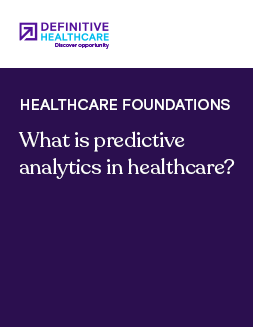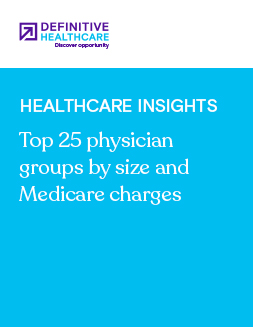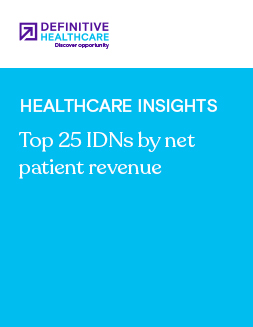Healthcare Insights
Top 15 population health management system vendors by installations
Population health management (PHM) is a healthcare approach that focuses on improving the health outcomes of a defined group of individuals through improved care coordination and patient engagement, supported by appropriate financial and care models. It's essentially a strategy to improve the overall health of a population, rather than just treating individual illnesses.
Healthcare providers and organizations use PHM software to help them implement and manage the strategies they develop. These tools typically combine clinical, financial, and operational data to equip providers with the insights necessary to care for unique patient groups defined by geography, therapy areas, and other criteria.
Below, we used data from Definitive Healthcare’s HospitalView product and the Atlas Dataset to identify the PHM system vendors with the highest volume of facility installations in 2024 YTD.
| Rank | PHM vendor | # of installs | % market share | Explore dataset |
|---|---|---|---|---|
| 1 | Epic Systems Corporation | 3,330 | 67.68% | Explore |
| 2 | Oracle Cerner | 783 | 15.91% | Explore |
| 3 | IBM | 179 | 3.64% | Explore |
| 4 | MEDITECH | 121 | 2.46% | Explore |
| 5 | eClinicalWorks | 111 | 2.26% | Explore |
| 6 | athenahealth | 83 | 1.69% | Explore |
| 7 | Philips Healthcare | 73 | 1.48% | Explore |
| 8 | Optum | 64 | 1.30% | Explore |
| 9 | Arcadia.io | 55 | 1.12% | Explore |
| 10 | Virgin Pulse | 53 | 1.08% | Explore |
| 11 | Veradigm Inc | 44 | 0.89% | Explore |
| 12 | TruBridge | 43 | 0.87% | Explore |
| 13 | MediKeeper | 41 | 0.83% | Explore |
| 14 | ZeOmega | 32 | 0.65% | Explore |
| 15 | Health Catalyst | 31 | 0.63% | Explore |
Fig. 1 – Data is from the Definitive Healthcare HospitalView product. Data accessed August 2024.
Which population health management system vendor is most popular based on facility installations?
Epic Systems Corporation ranks at the top of our list with 3,330 installations of its PHM software at hospitals around the country. It has a market share of nearly 68%. Epic typically bundles its PHM software with its existing electronic health record (EHR) system which collects and aggregates patient data to help providers track care quality and cost and improve care coordination across specific populations.
Oracle Cerner comes in second, with 783 installations of its own PHM platform—and holds a market share of almost 16%.
Trailing in third is IBM, with 179 installations and a market share of 3.64%.
Together, all 15 vendors represent 5,043 facility installations.
How do population health management systems work with EHRs?
PHM software is often packaged with EHR platforms that help providers coordinate care by delivering convenient, accurate, and actionable information on a patient’s medical history to inform diagnoses and care plans. When effectively integrated, PHM systems incorporate and share data with their corresponding EHR platforms.
PHM systems may also integrate with electronic medical record (EMR) software. Some clinicians use the terms “EHR” and “EMR” interchangeably, but their capabilities vary greatly. An EMR is a digital version of a patient’s clinical chart for a specific facility or practice, while an EMR is a digital record of a patient’s entire health journey across providers.
Population health management vs. chronic care management systems
Many PHM vendors also produce chronic care management software, often as part of an application suite built around an EHR.
Because PHM systems incorporate a variety of data sources across patient groupings, they enable providers to identify and address chronic illnesses and other health concerns in a holistic, community-centered way. Good PHM systems give providers and public health specialists the tools to detect, prevent, and control disease outbreaks and epidemics, and assess potential barriers to healthcare access among vulnerable populations.
Like PHM systems, chronic care management (CCM) systems combine patient data from multiple sources to inform treatment plans and improve care outcomes. But unlike PHM, CCM systems are centered on the treatment of individual patients with chronic care needs. Data from these systems may be aggregated within PHM software to inform population-level care plans, but they’re designed to be actionable in isolation.
CCM systems ideally reduce delays in care and miscommunication by bringing together information from every point in a patient’s care journey in a centrally accessible, HIPAA-compliant record.
Learn more
Healthcare Insights are developed with healthcare commercial intelligence from the Definitive Healthcare platform. Want even more insights on the technology used in healthcare facilities? Start a free trial now and get access to the latest healthcare commercial intelligence on hospitals, physicians, and other healthcare providers.



